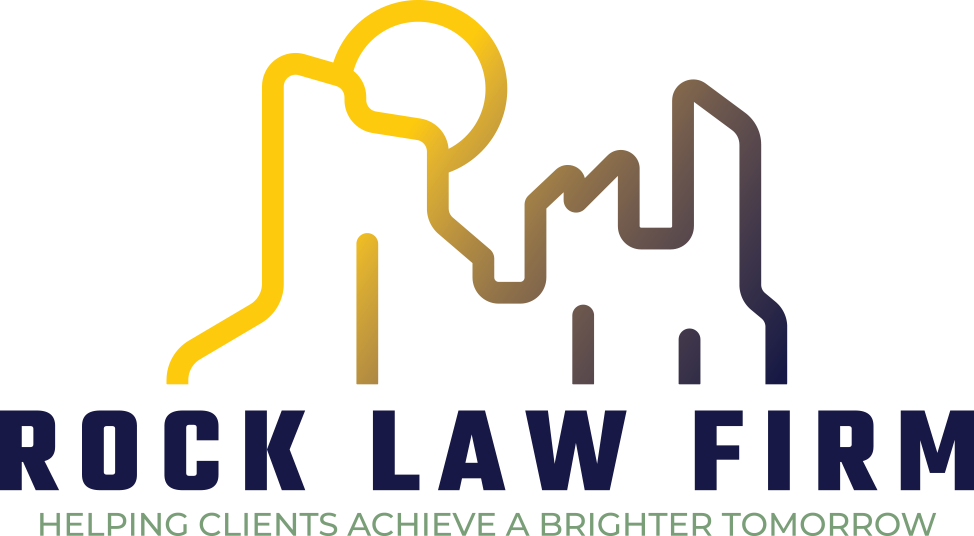Arizona Bankruptcy Laws
Discover Financial Freedom Without Losing Your Home and Car
Welcome to Rock Law Firm! We are proud to be the Greater Phoenix area's “nice guy” bankruptcy law firm. Not only do we offer zero-down filing and judgment-free consultation, but we also help regular Phoenix citizens navigate the confusing world of Arizona bankruptcy law, and take on the daunting task of filing with the local courts. To learn more about Arizona bankruptcy laws, read on. To get started with your filing, contact us for your complimentary consultation today.

Automatic Stay During Bankruptcy Can Help With:
Qualifications
Bankruptcy Filing Process
Exemptions
Legal Support

Arizona Bankruptcy Laws
Bankruptcy is the legal process that allows both people and companies to find relief from overwhelming debt. Bankruptcy is covered under federal law and is designed to give debtors a financial fresh start. There are six types of bankruptcy covered under federal bankruptcy law, with Chapters 7 and 13 being the most common. A bankruptcy discharge is the end result that releases the debtor from personal liability for certain debts and, in Chapter 13, establishes a repayment plan for other debts. The discharge is a permanent order handed down by the courts that releases the debtor from liability for debts and prevents creditors from taking legal action against the debtor to collect a debt.
Arizona Bankruptcy Qualifications
In 2005, Arizona bankruptcy laws changed slightly and established clearer expectations to help protect debtors, as well as prevent fraud and abuse. The Means Test is one thing that was established to help define bankruptcy qualifications. Because the primary purpose of a Chapter 7 bankruptcy is to eliminate debt, the Means Test determines what money or assets can be used to pay down some of the debts before they are absolved.
To qualify to file for bankruptcy, you’ll need to meet certain income requirements and calculate exemptions. To qualify for Chapter 7 bankruptcy, the debtor must earn less than the state median income as well as submit a Means Test, their financial records, documents stating income and expenses, and a complete list of debts.
To file for Chapter 13 bankruptcy, since there is no liquidation of assets or absolution of debt, the requirements are minimal compared to those for Chapter 7. Chapter 13 bankruptcy requires your unsecured debts to be less than $383,175 and secured debts must be less than $1,149,525.
Arizona bankruptcy law requires all filers to complete a credit counseling course prior to filing, which is available online, and a financial management course prior to completing your bankruptcy.
Arizona Bankruptcy Filing Process
To file for bankruptcy in Arizona, there are a few steps you’ll need to complete.
Step 1: Collect all of your debt and asset information — paystubs, bills, account balances, etc., and take the credit counseling course within six months before filing for bankruptcy.
Step 2: Complete a bankruptcy Means Test.
Step 3: Gather all paperwork — proof of income, financial documents for the last two years, monthly living expenses, debts, all assets and possessions.
Step 4: Determine exemptions.
Step 5: File petition with the bankruptcy court.
Step 6: Pay filing fee.
Step 7: If filing Chapter 13, submit a proposed repayment plan.
Once these steps are complete, you’ll receive an automatic stay. This will prevent creditors from contacting you or attempting to collect on a debt and will stop foreclosure. A bankruptcy trustee will be assigned to manage your debts and property to ensure that certain debts are paid.
About a month after filing, there will be a 341 meeting, with the debtors and their creditors. Here, the Trustee will verify your identity and ask some questions under oath to confirm that the bankruptcy is appropriate and to confirm whether or not there are any assets to deal with. Creditors may also appear and ask questions, although this is quite rare. From here, if you have filed a Chapter 7 bankruptcy, a discharge order can be finalized as soon as 60 days after the Meeting of Creditors; or if you filed a Chapter 13, the repayment plan will be initiated as agreed upon.
Bankruptcy Exemptions
Regardless of your income or which chapter of bankruptcy you file, there are a few exemptions that may protect your assets. Federal and Arizona exemptions include:
Asset |
Exemption |
|---|---|
| Homestead | Property, apartment, or mobile home you occupy up to $150,000; sale proceeds exempt 18 months after sale or until a new home is purchased, whichever occurs first. |
| Personal Property | 2 beds and 1 living room chair per person in the home. 1 dresser, table, lamp, and bedding per bed. Kitchen table, dining room table, and 1 chair per person. Living room carpet or rug, couch, 3 lamps, 3 coffee or end tables. Pictures, paintings, or art created by debtor. Family portraits. Refrigerator, stove, TV, radio, alarm clock, washer and dryer, and vacuum cleaner. Up to $4,000 total.
Bank account balance up to $150 Bible, bicycle, sewing machine, typewriter, burial plot, guns up to $500 total. Books up to $250 Clothing up to $500 Wedding or engagement rings up to $1,000 Watch up to $100 Pets and livestock up to $500 Musical instrument up to $250 Prosthetics and mobility devices Food and fuel up to 6 months Vehicle up to $1,500 (or $4,000 if disabled) Prepaid rent up to $1,000 or 1.5x rent, whichever is less Proceeds for sold or damaged exempt property |
| Insurance | Fraternal benefit society benefits
Group life insurance proceeds Health, accident, or disability benefits Life insurance cash value up to $20,000 Destruction of, or damage to, exempt property claims |
| Alimony or Child Support | |
| Tools of the Trade | Up to $5,000 in trade implements
$2,500 in farming tools Library and teaching aids of teachers Weapons and uniforms required by the profession |
| Wages | Lesser of 75% of disposable earnings or 30 times federal minimum wage per week
Arizona Board of Regents members ERISA- qualified benefits Firefighters, police officers, public safety personnel, rangers, and state employee wages. Minor child’s earnings. |
| Retirement Accounts | 401(k), 403 (b), profit-sharing and money purchase plans, SEP and SIMPLE IRA, defined-benefit plan |
| Unemployment Compensation | Exempt except for court-ordered child support |
| Workers' Compensation | |
| Welfare Benefits |

It is important to understand that regardless of your Means Test and exemptions, there are a few non-dischargeable debts that you will be responsible for repaying. These non-dischargeable debts include:
Child and spousal support — back payments and future dues
Debts owed for personal injury or death caused by driving while intoxicated
Student loans
Fines and penalties for breaking the law
Some tax debts
Debts not listed in bankruptcy filing (if there is a distribution of assets in your case)
Debts incurred under the basis of fraud, embezzlement, larceny, or breach of trust
Credit purchases within 90 days before filing
Loans or cash advances within 90 days before filing
Debts outlined in a divorce decree
Do You Need a Bankruptcy Lawyer?
Hiring a bankruptcy lawyer is not a legal requirement in Arizona. However, as we have already discussed, bankruptcy requirements, filing, and discharge are all complex processes. When you have an experienced bankruptcy attorney on your side, you have someone who understands the nuances of the law and can safely guide you through the process. When you have a bankruptcy lawyer like Jacob Goodman and his team at Rock Law firm on your side, we can help explain the law and how it applies to your specific situation and help you avoid any pitfalls. Connect with us for your complimentary consultation today.
